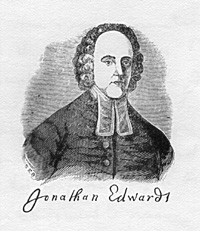Edwards' dreams eventually came crashing down, and he was forced to leave his Northampton pulpit amidst clouds of recrimination. The story of the clergyman's rise and fall is given dramatic shape in "The Flaming Spider: Jonthan Edwards in Northampton," a "memory play" by Austin Flint, a senior lecturer at Columbia University. This week, Jonathan Edwards College (JE), the Yale residential facility named for the alumnus minister, is sponsoring the world premiere of "The Flaming Spider." The work will be presented Friday-Sunday, Jan. 22-24, at the University Theatre, 222 York St. The show is directed by James Andreassi of the Elm Shakespeare Company. Admission is free, and the public is invited.
The grandson of Solomon Stoddard, a preacher known in his day as "The Pope of the Connecticut River Valley," Edwards entered Yale at age 13 and, upon graduation, embarked on his own career in ministry. Although he rose to become head of one of the largest and most influential parishes in Massachusetts, he increasingly found himself at odds with the members of his own congregation. Edwards was eventually banished to Stockbridge, where his parish was composed primarily of Native Americans. After a few years, the theologian was named president of Princeton University, but he died only months after taking office, as the result of an innoculation for smallpox.
"It was the curve of his life, its rise and fall, that got me interested in Jonathan Edwards as a good subject for a play," notes Flint, who has had 11 New York theatrical productions to his credit in as many years. "In a way, Edwards was a tragic hero."
Today, Edwards is best known for his sermon "Sinners in the Hands of an Angry God," which includes the lines from which "The Flaming Spider" takes its title: "... the God that holds you over the pit of hell, much as one holds a spider or some loathsome insect, over the fire, is dreadfully provoked. His wrath towards you burns like fire. You have offended him, yet it is only his hand that keeps you from falling into the flames. ..."
While these words may sound extreme, "Edwards was not your fire-and-brimstone, hell-and-damnation type preacher," insists Flint, "but a sensual man who loved music, who fought to preserve hymn singing in church, who exhorted his parish to experience nature's beauties as a way to understanding religious experience ... He even fathered 11 children."
"Sinners in the Hands of an Angry God" was really "Edwards' plea to his parishioners not to allow divisiveness and corruption to destroy the life of harmony that he worked desperately to get them to accept," explains Flint.
In fact, in his play, Flint emphasizes Edwards' enthusiasm for his ecclesiastical quest by using a very different image of spiders. Remarking on the rapidity with which his evangelical message has spread, the Edwards character says: "When I was a lad, I wrote a little piece on flying spiders, on how they spin their gossamer webs and cast themselves into the air on glistening strings of a great length and at such a height one would think they were tacked to the sky if they were not constantly moving and floating. Our glorious revival will spread like these miraculous webs, soaring wherever the winds of God will take them!"
Flint's play about Edwards first came to the attention of JE Master Gary Haller when a mutual colleague sent him a copy of the script. Haller invited Flint to read from the work at a master's tea on campus a year ago, and eventually named the playwright as an associate fellow of JE.
It is Flint's three-dimensional portrait of Edwards that inspired Haller to have "The Flaming Spider" produced on campus. "What is wonderful about the play is that you get a picture of Edwards as a human being," says Haller. "He was a very warm, friendly family man, who had a long and loving relationship with his wife. In the hour-and-a-half of this play, you see a side of Edwards that wouldn't be easily accessible otherwise."
To be sure that Flint's portrayal of the historic Edwards was accurate, Haller shared the script with the world-renowned experts on the theologian at The Works of Jonathan Edwards, Yale's project to publish the prolific preacher's many writings. Although the Yale Edwards scholars had a few "quibbles" about some aspects of "The Flaming Spider," they declared Flint's portrait of the famed minister to be sound, says Haller, who is the Becton Professor of Engineering and Applied Science, and chair of the chemical engineering department.
While this will be the first full production of "The Flaming Spider," the play was given a staged reading this fall at St. John the Divine Cathedral in New York. Director Andreassi has recruited his cast for the Yale show from the local campus and city talent. Portraying Jonathan Edwards is Andrew Stiegler, a graduate student in political science, and appearing as the preacher's wife, Sarah, is Cleo Godsey of Berkeley College.
"The Flaming Spider: Jonathan Edwards in Northampton" will be presented at 8 p.m. on Friday; at 2 p.m. and 8 p.m. on Saturday; and at 2 p.m. on Sunday. A reception will follow Friday's performance at Rose Alumni House, 232 York St.
For further information, call the JE master's office at 432-0380.

| Jonathan Edwards is best remembered for his sermons warning his congregation about the horrors of damnation, but a new play about the 18th-century minister offers a more three-dimensional portrayal of the preacher.
| |
 January 18-25, 1999
January 18-25, 1999